初中英语——一般将来时-最新教育文档
初中英语语法一般将来时

初中英语语法一般将来时【初中语法系列】一般将来时,结构是重点!一般将来时是初二英语要研究的内容,在初中整个语法系统中占非常重要的内容,也是历次考试的高频考点.1一般将来时的含义一般将来时表示将来某个时间要发生的动作或状态,或将来经常发生的动作或状态。
2一般将来时的基本结构1. will/shall+动词原形will在陈述句中用于各种人称;shall用于第一人称,常被will所代替。
否定式:will not=won'tshall not=shan't一般疑问式:will/shall+主语+动词原形+其他?特殊疑问式:特殊疑问词+一般疑问式?I will/shall do a better job next time.下次我要做得好些。
Oil and water will not mix.油和水没法混在一起。
—Will he help you with your English tonight?今天晚上他会帮助你研究英语吗?—Yes, he will./No, he won't.是的,他会。
/不,他不会。
—When will you arrive for America?你什么时候去美国?—Tomorrow.来日诰日。
2. am/is/are going to +动词原形否认式:am/is/are not going to +动词真相普通疑问式:am/is/are +主语+ going to +动词真相+其他?特殊疑问式:特殊疑问词+普通疑问式?He is going to spend his holidays in London.他打算在伦敦度假。
Look at the dark clouds. There is going to be a storm.看那乌云,快要下雨了。
Is he going to collect any data for us?他会帮我们搜集数据吗?What are you going to do tomorrow?明天你打算作什么?3will+动词原形与am/is/are going to +动词原形的用法区别will+动词原形与am/is/are going to +动词原形的用法虽然都表示将来发生动作或情况,一般情况下能互换。
(最新整理)初中英语一般将来时专项语法讲解
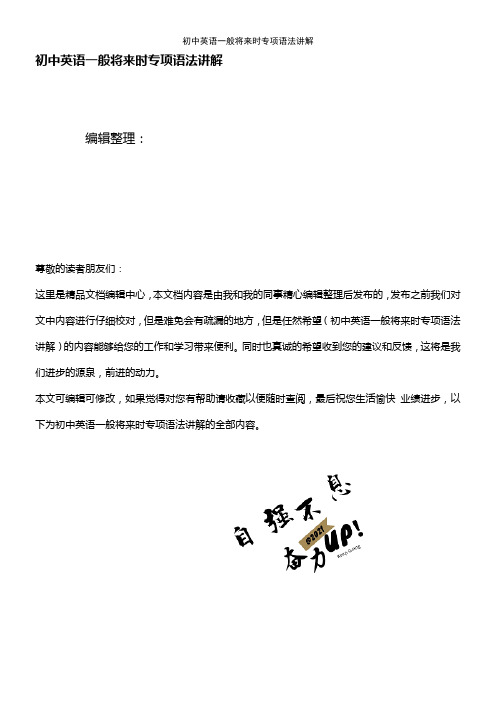
初中英语一般将来时专项语法讲解编辑整理:尊敬的读者朋友们:这里是精品文档编辑中心,本文档内容是由我和我的同事精心编辑整理后发布的,发布之前我们对文中内容进行仔细校对,但是难免会有疏漏的地方,但是任然希望(初中英语一般将来时专项语法讲解)的内容能够给您的工作和学习带来便利。
同时也真诚的希望收到您的建议和反馈,这将是我们进步的源泉,前进的动力。
本文可编辑可修改,如果觉得对您有帮助请收藏以便随时查阅,最后祝您生活愉快业绩进步,以下为初中英语一般将来时专项语法讲解的全部内容。
初中英语一般将来时专项语法讲解 一般将来时表示将来某个时间要发生的动作,事情或存在的状态,也表示将来经常或反复发生的动作或事情。
1)will/shall+动词原形 shall用于第一人称,常被will 所代替。
will 在陈述句中用于各人称,在征求意见时常用于第二人称。
will not=won't shall not=shan't例如: Which paragraph shall I read first?我先读哪一段呢? Will you be at home at seven this evening? 今晚七点回家好吗? 2) be going to +不定式,表示将来。
a. 主语的意图,即将做某事。
例如:What are you going to do tomorrow? 明天打算作什么呢? b。
计划,安排要发生的事.例如:The play is going to be produced next month。
这出戏下月开播。
c. 有迹象要发生的事。
例如:Look at the dark clouds, there is going to be a storm。
看那乌云,快要下雨了。
3) be +不定式表将来,按计划或正式安排将发生的事。
例如: We are to discuss the report next Saturday.我们下星期六讨论这份报告。
2024年中考英语语法复习—一般将来时课件

2)用在由when,if等引导的时间状语从句和 条件状语从句中,表示将来的动作。
If it doesn’t rain tomorrow,we will go hiking. 如果明天不下雨,我们将去远足。
★一般将来时经常会伴随一些时间状语,比较常见的有:
tomorrow
soon
next week下周
练习
1 . There ________ a sports meet next week if it
________.
A.is going to have; doesn’t rain
B.is going to be; doesn’t rain
C.is going to be; won’t rain D.is going to have; won’t rain
Will you go there? 你要去那儿吗?
“Shall I...?”“Shall we...?”常用来征求对方意见。“Will you...?”表示客气的邀请或请求。
Will you please open the window? 请你把窗打开,好吗?
3.否定句:在will/shall后加not,可缩写成 won’t/shan’t 陈述句:I will go there./I shall go there. 我要去那儿。
to +
+其他
not,即主语+be not going
I am not going to watch the video. 我不准备去看录像。
3)一般疑问句:将be
Is he going to see a doctor? 他准备去看医生吗?
4)含有be goi to+动词原形+其他
“一般将来时”的几种语法形式知识讲解

“一般将来时”的几种语法形式“一般将来时”的几种语法形式初中英语中表示一般将来时的语法形式有四种:shall/will+动词原形;be going to+动词原形;现在进行时和一般现在时。
现将这四种形式分述如下:一.shall/will+动词原形1.will可用于所有人称,但shall仅表示单纯将来时,用于第一人称I和we,作为will的一种替代形式。
以You and I为主语时通常避免用shall。
例如:He will be back soon.他很快就会回来。
I shall/will be free on Sunday.星期天我有空。
You and I will work in the same factory.你和我将在同一工厂工作。
2.will,shall可用来预言将来发生的事。
如说出我们设想会发生的事,或者请对方预言将要发生什么事。
例如:It will rain tomorrow.明天将要下雨。
3.will,shall除可表示单纯的将来时以外,还可以带有意愿的色彩,仍指的是将来。
例如:I’ll buy you a bicycle for your birthday.你过生日时,我给你买一辆自行车。
(表示允诺)Will you open the door for me please?请你帮我开门好吗?(表示请求)Shall I get your coat for you?我可以为你拿外套吗?(表示提议)二.be going to+动词原形1.表示说话人根据现在已有的迹象,判断将要或即将发生某种情况。
这类句子的主语可以是人,也可是物。
例如:There is going to be a football match in our school tomorrow afternoon.明天下午我们学校将有一场足球赛。
(已有告示)I feel terrible.I think I’m going to die.我感到难受极了,我想我快不行了。
(完整版)一般将来时初中语法
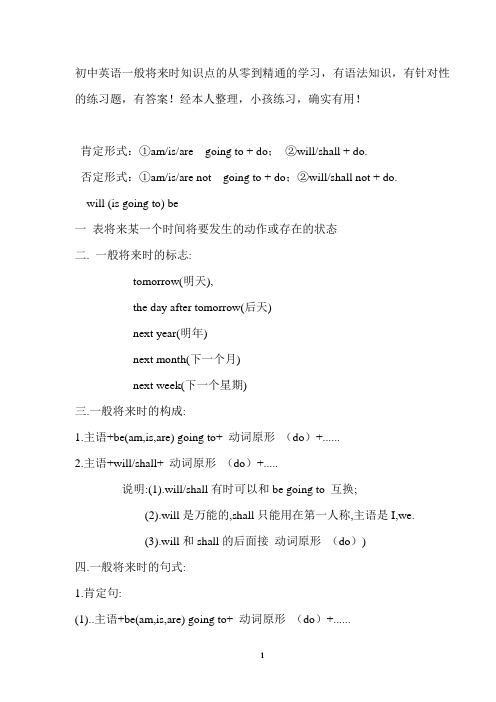
初中英语一般将来时知识点的从零到精通的学习,有语法知识,有针对性的练习题,有答案!经本人整理,小孩练习,确实有用!肯定形式:①am/is/are going to + do;②will/shall + do.否定形式:①am/is/are not going to + do;②will/shall not + do.will (is going to) be一表将来某一个时间将要发生的动作或存在的状态二. 一般将来时的标志:tomorrow(明天),the day after tomorrow(后天)next year(明年)next month(下一个月)next week(下一个星期)三.一般将来时的构成:1.主语+be(am,is,are) going to+ 动词原形(do)+......2.主语+will/shall+ 动词原形(do)+.....说明:(1).will/shall有时可以和be going to 互换;(2).will是万能的,shall只能用在第一人称,主语是I,we.(3).will和shall的后面接动词原形(do))四.一般将来时的句式:1.肯定句:(1)..主语+be(am,is,are) going to+ 动词原形(do)+......(2)..主语+will/shall+ 动词原形(do)+.....2.否定句:(1)..主语+be(am,is,are) not going to+ 动词原形(do)+......(2)..主语+will/shall not+ 动词原形(do)+.....3.一般疑问句:(1).Am/Is,Are+主语+going to+ 动词原形(do)+....(2).Will//shall+主语+ 动词原形(do)+...4.特殊疑问句:(1).What (Where, How...)+be (am,is,are)+主语+ going to + 动词原形(do)+...?(2). What (When,Where,How...) +will/shall+ 主语+ 动词原形(do)+...?二、基本结构:①be going to + do;②will+ do.三、否定句:在be动词(am, is, are)后加not或will后加not成won’t。
(完整版word)英语一般将来时形式讲解及答案解析
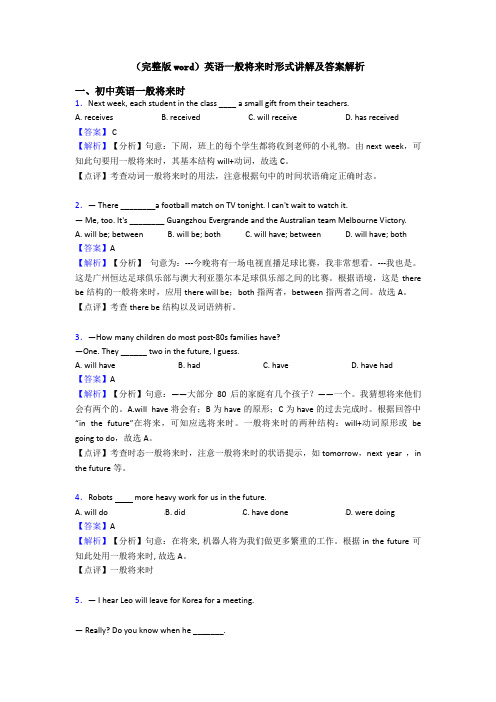
(完整版word)英语一般将来时形式讲解及答案解析一、初中英语一般将来时1.Next week, each student in the class ____ a small gift from their teachers.A. receivesB. receivedC. will receiveD. has received【答案】 C【解析】【分析】句意:下周,班上的每个学生都将收到老师的小礼物。
由next week,可知此句要用一般将来时,其基本结构will+动词,故选C。
【点评】考查动词一般将来时的用法,注意根据句中的时间状语确定正确时态。
2.— There ________a football match on TV tonight. I can't wait to watch it.— Me, too. It's ________ Guangzhou Evergrande and the Australian team Melbourne Victory.A. will be; betweenB. will be; bothC. will have; betweenD. will have; both【答案】A【解析】【分析】句意为:---今晚将有一场电视直播足球比赛,我非常想看。
---我也是。
这是广州恒达足球俱乐部与澳大利亚墨尔本足球俱乐部之间的比赛。
根据语境,这是there be结构的一般将来时,应用there will be;both指两者,between指两者之间。
故选A。
【点评】考查there be结构以及词语辨析。
3.—How many children do most post-80s families have?—One. They ______ two in the future, I guess.A. will haveB. hadC. haveD. have had【答案】A【解析】【分析】句意:——大部分80后的家庭有几个孩子?——一个。
完整)初中英语一般将来时
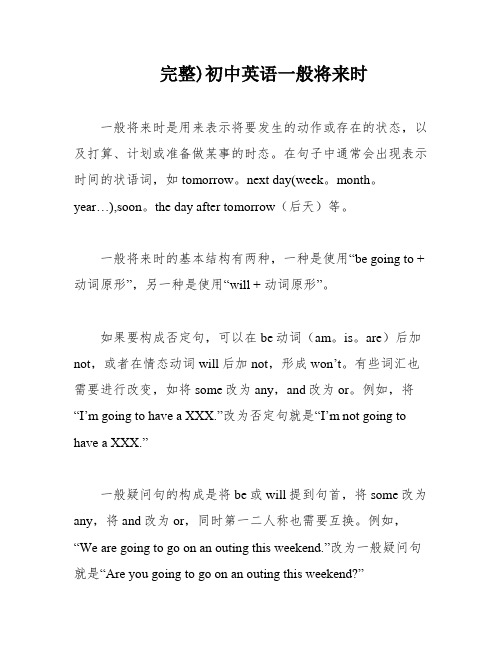
完整)初中英语一般将来时一般将来时是用来表示将要发生的动作或存在的状态,以及打算、计划或准备做某事的时态。
在句子中通常会出现表示时间的状语词,如tomorrow。
next day(week。
month。
year…),soon。
the day after tomorrow(后天)等。
一般将来时的基本结构有两种,一种是使用“be going to + 动词原形”,另一种是使用“will + 动词原形”。
如果要构成否定句,可以在be动词(am。
is。
are)后加not,或者在情态动词will后加not,形成won’t。
有些词汇也需要进行改变,如将some改为any,and改为or。
例如,将“I’m going to have a XXX.”改为否定句就是“I’m not going to have a XXX.”一般疑问句的构成是将be或will提到句首,将some改为any,将and改为or,同时第一二人称也需要互换。
例如,“We are going to go on an outing this weekend.”改为一般疑问句就是“Are you going to go on an outing this weekend?”对于划线部分的提问,一般将来时的对划线部分有三种情况。
第一种是问人,可以使用Who,例如“I’m going to New York soon.”改为问句就是“Who’s going to New York soon?”第二种是问干什么,可以使用What … do,例如“My father is going to watch a race with me this after noon.”改为问句就是“What is your father going to do with you this afternoon?”第三种是问什么时候,可以使用When,例如“She’s going to go to bed at nine.”改为问句就是“When is she going to bed?”同义句的构成是将be going to改为will,例如“I am going to go XXX.”可以改为“I will go XXX.”最基本的一般将来时结构是使用“will + 动词原形”,例如“XXX.”表示明天他们将要参观博物馆。
初中英语_八年级一般将来时_课件

am going to walk is going to visit
are going to buy
is going to be are are going to do going to meet am going to stay Are going to see
Dreams come true!
in May in 2012
I
We They She
this Sunday
this weekend tomorrow at six o’clock
I’m going to climb mountains next month.
I’m (not) going to be a teacher
Are you going to be a teacher? Yes, I am./ No, I’m not.
I’m (not) going to be a teacher
Are you going to be a teacher? Yes, I am./ No, I’m not.
What are you going to be?
He’s (not) going to see a film. They’re going to play basketball. There’s going to be a new film.
What are you going to be?
He’s (not) going to see a film. They’re going to play basketball. There’s going to be a new film.
A: B: A: B:
What are you going to be according to the card? It says I’m going to be a/an… Are you really going to be a/an…? I don’t think so. I’m going to be a/an… because ... How about you? A: It says I’m going to be a/an…
初中英语语法——一般将来时
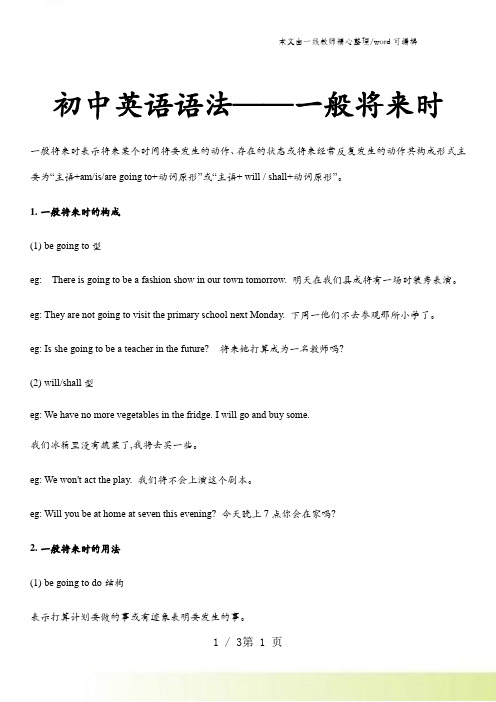
初中英语语法——一般将来时一般将来时表示将来某个时间将要发生的动作、存在的状态或将来经常反复发生的动作其构成形式主要为“主语+am/is/are going to+动词原形”或“主语+ will / shall+动词原形”。
1.一般将来时的构成(1)be going to型eg: There is going to be a fashion show in our town tomorrow. 明天在我们县成将有一场时装秀表演。
eg: They are not going to visit the primary school next Monday. 下周一他们不去参观那所小学了。
eg: Is she going to be a teacher in the future? 将来她打算成为一名教师吗?(2)will/shall型eg: We have no more vegetables in the fridge. I will go and buy some.我们冰箱里没有蔬菜了,我将去买一些。
eg: We won't act the play. 我们将不会上演这个剧本。
eg: Will you be at home at seven this evening? 今天晚上7点你会在家吗?2.一般将来时的用法(1)be going to do结构表示打算计划要做的事或有迹象表明要发生的事。
eg: I'm going to ski tomorrow.明天我要去滑雪。
(计划、打算)eg: It' s going to be a fine day tomorrow. 明天将会是个好天气。
(迹象表明要发生)(2) will /shall do 结构will/shall do 结构表示未经过事先考虑的意图,当主语是第一人称时用shall, will 可用于各种人称。
eg: How long will the work take? 这项工作要花多长时间? (推测)eg: From now on I will shall come for the newspapers every Monday.从现在起,我每周一都来拿报纸。
初中英语一般将来时
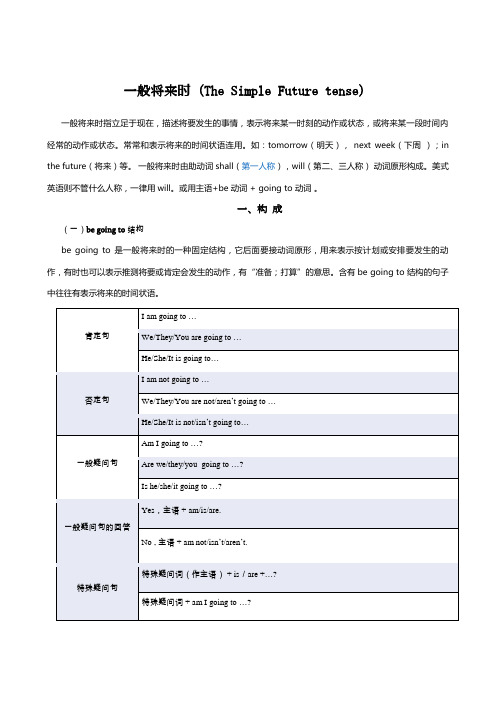
一般将来时(The Simple Future tense)一般将来时指立足于现在,描述将要发生的事情,表示将来某一时刻的动作或状态,或将来某一段时间内经常的动作或状态。
常常和表示将来的时间状语连用。
如:tomorrow(明天),next week(下周);in the future(将来)等。
一般将来时由助动词shall(第一人称),will(第二、三人称)动词原形构成。
美式英语则不管什么人称,一律用will。
或用主语+be动词+ going to 动词。
一、构成(一)be going to 结构be going to 是一般将来时的一种固定结构,它后面要接动词原形,用来表示按计划或安排要发生的动作,有时也可以表示推测将要或肯定会发生的动作,有“准备;打算”的意思。
含有be going to 结构的句子中往往有表示将来的时间状语。
I am going to move to another school next term.下学期我要搬到另一家学校。
He is not going to come to the get-together tomorrow. 他不打算参加明天的聚会了。
——Are they going to leave for Australia next week? 他们下周打算出发到澳大利亚吗?——Yes , they are. / No , they aren’t .是的。
/不。
What are you going to do this evening ?今晚你打算干什么?(二)will 结构I will finish all the housework very soon.我很快就会完成这些家务活。
They won’t move away until tomorrow.他们明天才搬走。
——Will Mr. white give us a lecture tomorrow ?史密斯先生明天给我们作讲座吗?——Yes, he will ./ No , he won’t .是的。
初中英语语法——一般将来时详细讲解
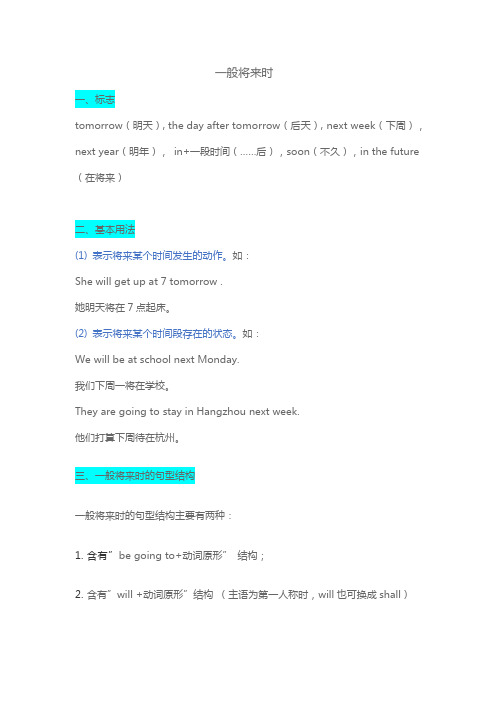
一般将来时一、标志tomorrow(明天), the day after tomorrow(后天), next week(下周),next year(明年),in+一段时间(……后),soon(不久),in the future (在将来)二、基本用法(1) 表示将来某个时间发生的动作。
如:She will get up at 7 tomorrow .她明天将在7点起床。
(2) 表示将来某个时间段存在的状态。
如:We will be at school next Monday.我们下周一将在学校。
They are going to stay in Hangzhou next week.他们打算下周待在杭州。
三、一般将来时的句型结构一般将来时的句型结构主要有两种:1.含有”be going to+动词原形”结构;2.含有”will +动词原形”结构(主语为第一人称时,will也可换成shall)(1)肯定句:She is going to buy some vegetables tomorrow morning . 她打算明天上午买一些蔬菜。
(2)否定句:在be动词后加not。
is和are可以和not缩写为isn't,aren't。
She isn’t going to buy any vegetables tomorrow morning . 她明天上午不去买蔬菜。
(3)一般疑问句及其答语:将be动词放在句子开头,且首字母要大写,句末用问号。
肯定回答:Yes,主语的相应代词+am/is/are.否定回答:No,主语的相应代词+am not /isn't/aren't.—Is she going to buy any vegetables tomorrow morning?她打算明天上午去买一些蔬菜吗?—Yes,she is./No,she isn't. 是的,她打算去。
一般将来时(24张PPT)初中英语专项复习课件

11.what _____ they _______( do ) tomorrow ? 12.The boy _______( not have ) an English lesson tomorrow . 13.________ you _______( learn ) Chinese next week ? 14.I ________ ( arrive ) there tomorrow . 15.Mike _________ ( not watch ) a movie tomorrow .
( ) 10. If they come, we ________ a meeting.
A. have
B. will have C. had
D. would have
( ) 11. He ________ her a beautiful hat on her next birthday.
A. gives
I _________ (milk) cows.
Key:1 will visit 2 will go 3 will…do, will milk
归纳
重点一
Will和be going to 的区别
重点二
Shall的用法
shall用于第一人称,表示将要,相当于will。 例如:We shall take a walking. 特殊: shall用于第二、第三人称,则含有命令、警告、允诺或威胁的语气。 例如: He shall do the dishes before he plays video games.(命令的意味较浓。)
A. will be; is
B. is; is
C. will be; will be
D. is; will be
一般将来时(20张PPT)初中英语专项复习课件

初中英语专项复习
一般将来时
构成
1.I will be 18 next year. 2.PTG will fight in a second. 3.PTG is going to fight in a second. 4.It is going to rain tomorrow.
sb. will do sb. be going to do
B 询问对方Байду номын сангаас愿
Will you marry me? Will you go shopping with me?
一般将来时
【例题】
典型例题
Susan and her sister ______ some photos in the park the day after tomorrow.
A.take
YOUR LOGO
THANK YOU
一般先斩后奏
There will be There is/are going to be There is going to be 2 exams tomorrow.
典型例题
【例题】
B There_________ a basketball match between Class
One and Class Three this afternoon.
B. taking
C√. are going to take D. takes
一般将来时
一般将来时
句型转换
He will eat KSY tomorrow. He will not eat KSY tomorrow.
一般先斩后奏
Will he eat KSY tomorrow? What will he eat tomorrow? What will he do tomorrow?
【优质文档】一般将来时will
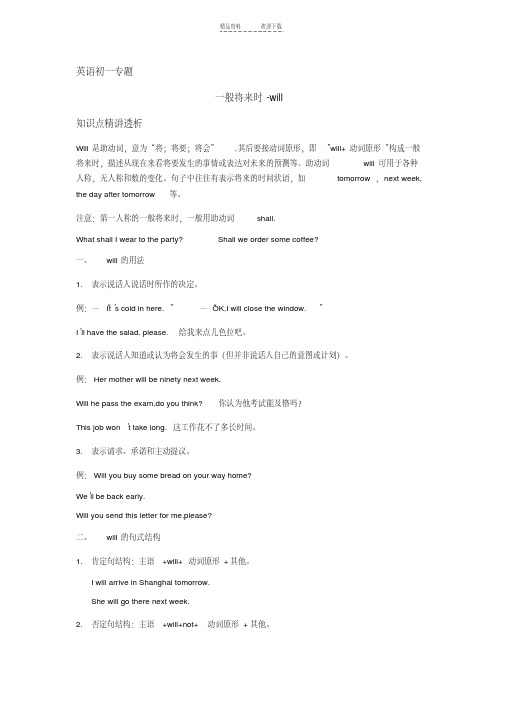
英语初一专题一般将来时-will知识点精讲透析Will是助动词,意为“将;将要;将会”,其后要接动词原形,即”will+动词原形”构成一般将来时,描述从现在来看将要发生的事情或表达对未来的预测等。
助动词will可用于各种人称,无人称和数的变化。
句子中往往有表示将来的时间状语,如tomorrow,next week, the day after tomorrow等。
注意:第一人称的一般将来时,一般用助动词shall.What shall I wear to the party? Shall we order some coffee?一、will的用法1.表示说话人说话时所作的决定。
例:—“It’s cold in here.”—“OK,I will close the window.”I’ll have the salad, please.给我来点儿色拉吧。
2.表示说话人知道或认为将会发生的事(但并非说话人自己的意图或计划)。
例:Her mother will be ninety next week.Will he pass the exam,do you think?你认为他考试能及格吗?This job won’t take long.这工作花不了多长时间。
3.表示请求、承诺和主动提议。
例:Will you buy some bread on your way home?We’ll be back early.Will you send this letter for me,please?二、will的句式结构1.肯定句结构:主语+will+动词原形+其他。
I will arrive in Shanghai tomorrow.She will go there next week.2.否定句结构:主语+will+not+动词原形+其他。
由于will是助动词,因此否定句直接在will后加not即可。
(最新整理)初中英语一般将来时
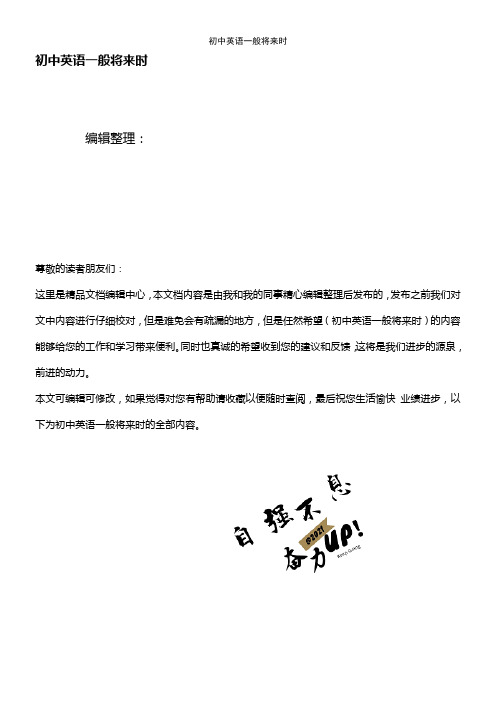
初中英语一般将来时编辑整理:尊敬的读者朋友们:这里是精品文档编辑中心,本文档内容是由我和我的同事精心编辑整理后发布的,发布之前我们对文中内容进行仔细校对,但是难免会有疏漏的地方,但是任然希望(初中英语一般将来时)的内容能够给您的工作和学习带来便利。
同时也真诚的希望收到您的建议和反馈,这将是我们进步的源泉,前进的动力。
本文可编辑可修改,如果觉得对您有帮助请收藏以便随时查阅,最后祝您生活愉快业绩进步,以下为初中英语一般将来时的全部内容。
一般将来时Step1 Review一般将来时 一、概念:表示将要发生的动作或存在的状态及打算、计划或准备做某事。
句中一般有以下时间状语:tomorrow, next day(week, month, year…),soon, the day after tomorrow(后天)等。
二、基本结构:①be going to + do; ②will+ do.三、否定句:在be动词(am, is, are)后加not或情态动词will后加not 成won’t, some改为any, and改为or 例如:I’m going to have a picnic this afternoon.→ I’m not going to have a picnic this afternoon。
四、一般疑问句:be或will提到句首,some改为any, and改为or,第一二人称互换. 例如:We are going to go on an outing this weekend。
→Are yougoing to go on an outing this weekend?五、对划线部分提问:一般情况,一般将来时的对划线部分有三种情况。
1. 问人。
Who 例如:I'm going to New York soon。
→Who’s going to New York soon.2. 问干什么。
初中英语-一般将来时

⑵ 表示“带有情态意义的将来”: ② 在疑问句中,用来有礼貌地征询对方的意见。例如:
---Shall I open the window? --- Yes, please. (= Would you like me to…?) 我把窗户打开好吗?——好,请吧。 What shall we do this weekend? 本周末我们干什么呢? Will you have some more tea? 要不要再来点茶?
③ 表示由于习惯或倾向而会经常发生的动作,本用法中的will要重读。例如: Accidents will happen. 意外事故是不可避免的。 Boys will be boys. [谚语]男孩毕竟是男孩。(意指顽皮是难免的。) This window won’t open. 这扇窗户经常打不开。
2. -学生们准备明天干什么? -帮助农民摘苹果。 are the students _______ going _______ to do tomorrow -What ______ _______ ________? are ______ going ______ to help farmers ______ pick apples. -They ______ ______ 3. -下周有次英语测试吗?
He is going to be a doctor when he grows up. 他长大了想当医生。 They are going to buy a new car next year. 他们准备明年买一部新车。
be going to结构表示将来
⑵ 表示现在已有迹象表明即将发生某种事 态。主语有时是人,有时是物。例如:
4. 瞧那些云彩,要下雨了。 is going _______ to rain Look at the clouds. It ______ _______ _______.
- 1、下载文档前请自行甄别文档内容的完整性,平台不提供额外的编辑、内容补充、找答案等附加服务。
- 2、"仅部分预览"的文档,不可在线预览部分如存在完整性等问题,可反馈申请退款(可完整预览的文档不适用该条件!)。
- 3、如文档侵犯您的权益,请联系客服反馈,我们会尽快为您处理(人工客服工作时间:9:00-18:30)。
初中英语——一般将来时一般将来时表示现在看来,将来要发生的动作或存在的状态。
常与tomorrow,next year/week/month,in a few days,in the future,sometimes next week等表示将来的时间状语连用。
1.一般将来时谓语动词的结构形式
(1)will/shall+动词原形。
如:
I think he will tell us the truth.
Will you be free this evening?
What shall we do if he doesn’t come?
(2)will/shall+动词原形构成的一般将来时一般疑问句、否定句、特殊疑问句结构及一般疑问句的答语:
*一般疑问句为:将will/shall放在句子开头,且首字母要大写,句末用问号。
*肯定回答为:Yes,+主语的相应代词+will或shall;
*否定回答为:No,+主语的相应代词+won't或shan’t;
*否定句为:在will或shall后加not+动词原形。
will和shall可以和not缩写为won't,shan't。
*特殊疑问句为:特殊疑问词+be的相应形式+主语+现在分词+s......?如:
—Will your uncle visit our school next week?(一般疑问句)
—Yes,he will./No,he won’t.(肯定、否定回答)
—Will your parents be back from America in a week?(一般疑问句)
—Yes,they will./No,they won’t.(肯定、否定回答)
They won’t go to Xiaoping’s hometown for a trip.(否定句)
What will they do next week?(特殊疑问句)
(3)be going to+动词原形。
如:
We are going to have a meeting to discuss the matter this evening.
Look at the black clouds over there. I think it is going to rain soon.
There is going to be an English evening this week.
(4)be going to+动词原形构成的一般将来时一般疑问句、否定句、特殊疑问句结构及一般疑问句的答语:
*一般疑问句为:将am,is,are放在句子开头,且首字母要大写,句末用问号。
*肯定回答为:Yes,+主语的相应代词+am,is或are;
*否定回答为:No,+主语的相应代词+isn't或aren’t(第一人称的否定回答是No,I’m not)。
*否定句为:在am,is,are后加not+going to+动词原形。
is和are可以和not缩写为isn't,aren't。
*特殊疑问句为:特殊疑问词+be的相应形式+主语+going to+动词原形+......?如:
—Are you going to have a picnic in the park?(一般疑问句)
—Yes,we are./No,we aren’t.(肯定、否定回答)
—Is your teacher going to play basketball this afternoon ?(一般疑问句)
—Yes,he is./No,he isn’t.(肯定、否定回答)
We aren’t going to see the movie tomorrow.(否定句)
What are they going to do this evening?(特殊疑问句)
2.一般将来时的用法
(1)will/shall+动词原词,表示将要发生的动作或存在的状态。
特别是表示客观性的事情或在某条件下要发生的事情,只能用此结构。
如:
I will finish all the housework very soon.
They will move to Shanghai next month.
We will go for a picnic if it doesn’t rain this Sunday.
(2)be going to+动词原形。
表示即将、将要、打算做已经计划或安排好了的事情,也可表示有迹象表明肯定要发生的事情。
如:
He is going to visit his grandparents on Saturday.
Lin Tao and I are going to the zoo tomorrow.
What are you going to do this weekend?
(1)come,go,leave,arrive,begin,start,stop,close,open,die,join,borrow,buy等短暂动作的动词,它们的“be+现在分词”形式表示计划或安排好的动作或即将发生的动作或存在的状态。
如:
Go ahead ,and I’m coming.
The dog is dying.
Hurry up. The shop is closing.
We are leaving for Shanghai tomorrow.
(2)在条件状语从句和时间状语从句中,用一般现在时代替将要发生的动作。
如:
He will not come if it rains tomorrow.
We will start our meeting as soon as our teacher comes.
(3)在“祈使句+and/or+陈述句”结构中,其中的陈述句要用一般将来时。
如:
Work hard,and you will pass the exam.
Hurry up,or you’ll miss the early bus.
(6)其他表示将要发生的动作句型:
①be to+动词原形。
表示一种职责、义务、意图、约定、可能性等常规性的活动或注定要做的事情。
如:
Who is to clean the classroom today?
When are you to return your library book?
The bridge is to be completed by the end of this year.
②be about to+动词原形。
表示即将就要做或正好要做的事情。
往往暗含一种时间上的巧合,因此,句子不能再用时间状语。
如:
Don’t leave. Li Lei is about to come.
Be quiet. The concert is about to start.
The plane is about to take off.
The meeting is about to start now.
3.“will/shall+动词原形与be going to+动词原形”的用法区别
Will/shall+动词原形与be going to+动词原形,两者均可表示将来的时间和意图,有时可换用,有时不可换用。
不可换用的情况主要是:
(1)若强调某个意图是事先考虑好的,用be going to;若表示某个意图没有经过事先考虑,而是在说话的当时才临时想到的,则用will。
试比较:
“Mary is in hospital.”“Oh,really? I didn’t know. I’ll go and visit her.”(临时想法,不能用be going to)
“Mary is in hospital.”“Yes,I know. I’m going to visit her tomorrow.”(事先考虑的意图,不能用will)
(2)如果某种迹象表明要发生某事,用be going to而不用will。
如:
Look at those black clouds. It’s going to rain.
(3)在含有条件或时间状语从句的复合句中,主句一般用will/shall+动词原形,而不用be going to+动词原形。
如:
If it rains tomorrow,we’ll stay at home.
(4)表示不受人的主观意愿影响的单纯的将来,一般只用will+动词原形。
如:
Tomorrow will be Teachers’ Day.
(5)在正式的通知中多用will+动词原形。
如:
There will be a strong wind to the north of the Huai River.。
